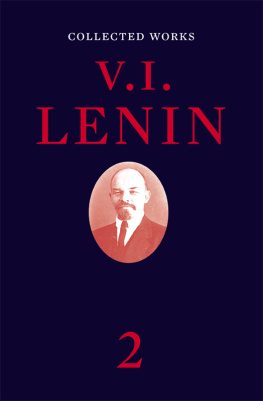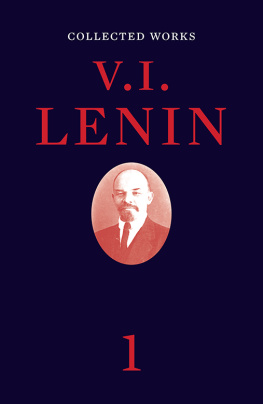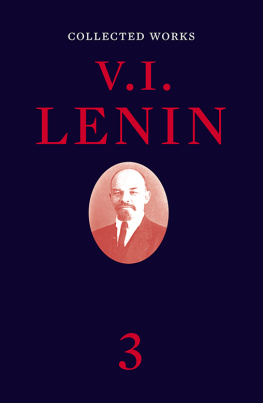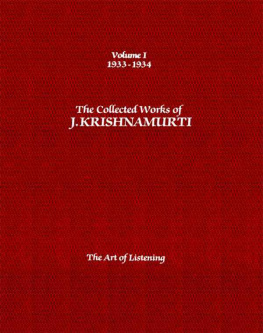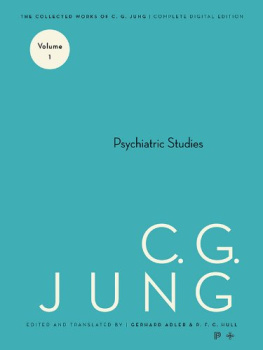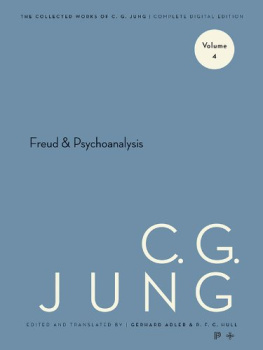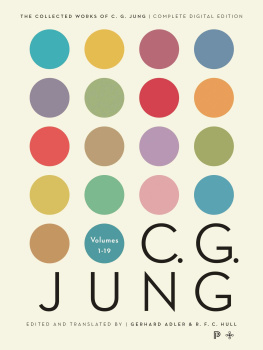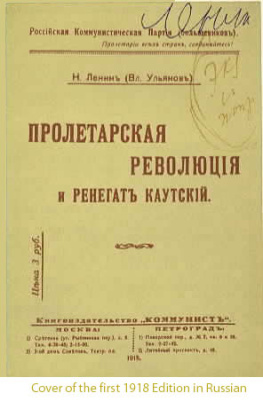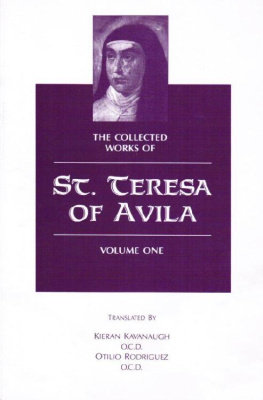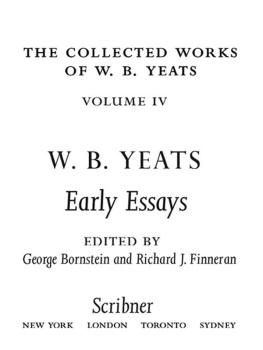V. I. Lenin - Collected Works, Volume 2
Here you can read online V. I. Lenin - Collected Works, Volume 2 full text of the book (entire story) in english for free. Download pdf and epub, get meaning, cover and reviews about this ebook. year: 0, publisher: Verso Books, genre: Romance novel. Description of the work, (preface) as well as reviews are available. Best literature library LitArk.com created for fans of good reading and offers a wide selection of genres:
Romance novel
Science fiction
Adventure
Detective
Science
History
Home and family
Prose
Art
Politics
Computer
Non-fiction
Religion
Business
Children
Humor
Choose a favorite category and find really read worthwhile books. Enjoy immersion in the world of imagination, feel the emotions of the characters or learn something new for yourself, make an fascinating discovery.
- Book:Collected Works, Volume 2
- Author:
- Publisher:Verso Books
- Genre:
- Year:0
- Rating:3 / 5
- Favourites:Add to favourites
- Your mark:
- 60
- 1
- 2
- 3
- 4
- 5
Collected Works, Volume 2: summary, description and annotation
We offer to read an annotation, description, summary or preface (depends on what the author of the book "Collected Works, Volume 2" wrote himself). If you haven't found the necessary information about the book — write in the comments, we will try to find it.
Collected Works, Volume 2 — read online for free the complete book (whole text) full work
Below is the text of the book, divided by pages. System saving the place of the last page read, allows you to conveniently read the book "Collected Works, Volume 2" online for free, without having to search again every time where you left off. Put a bookmark, and you can go to the page where you finished reading at any time.
Font size:
Interval:
Bookmark:

WORKERS OF ALL COUNTRIES, UNITE!
COLLECTED WORKS

THE RUSSIAN EDITION WAS PRINTED
IN ACCORDANCE WITH A DECISION
OF THE NINTH CONGRESS OF THE R.C.P.(B.)
AND THE SECOND CONGRESS OF SOVIETS
OF THE U.S.S.R.
V.I. LENIN
COLLECTED WORKS
VOLUME
18951897
The typeset files we have used in these editions were created by David J. Romagnolo and are taken from www.marx2mao.com. They represent years of work, meticulously re-creating a stunningly high resolution, re-type-set digital archive of Lenins Collected Works and the PDFs are free to download. Every effort has been made to contact Mr Romagnolo to obtain his permission, but without success, but we are keen to reimburse him.
This English edition of V. I. Lenins Collected Works is a translation of the fourth, enlarged Russian edition prepared by the Institute of Marxism-Leninism, Central Committee of the C.P.S.U.
Corrections have been made to some of the texts and notes in accordance with the fifth Russian edition, and some further editorial comments have been added.
This paperback edition first published by Verso 2018
First published in English by Progress Publishers 1960
Verso 2018
All rights reserved
The moral rights of the author have been asserted
1 3 5 7 9 10 8 6 4 2
Verso
UK: 6 Meard Street, London W1F 0EG
US: 20 Jay Street, Suite 1010, Brooklyn, NY 11201
versobooks.com
Verso is the imprint of New Left Books
ISBN-13: 978-1-78663-631-7
ISBN-13: 978-1-78663-632-4 (UK EBK)
ISBN-13: 978-1-78663-633-1 (US EBK)
British Library Cataloguing in Publication Data
A catalogue record for this book is available from the British Library
Library of Congress Cataloging-in-Publication Data
A catalog record for this book is available from the Library of Congress
Printed in the United States
_______
Volume two contains Lenins works of the 1895-97 period. The first group of works in the volume, namely, Frederick Engels, Draft and Explanation of a Programme for the Social-Democratic Party, The Tasks of the Russian Social-Democrats, and The Heritage We Renounceis devoted to an elaboration of the tasks of the Russian Marxists as far as their programme, tactics and organisation are concerned.
A considerable part of the present volume is made up of Lenins economic writings directed against the Narodniks: A Characterisation of Economic Romanticism, The Handicraft Census of 1894-95 in Perm Gubernia and General Problems ofHandicraftIndustry, Gems of Narodnik Project-Mongering, etc.
The third group contains agitational works by Leninthe pamphlets Explanation of the Law on Fines Imposed on Factory Workers, and The New Factory Law, the leaflets To the Working Men and Women of the Thornton Factory and To the Tsarist Government, and the article What Are Our Ministers Thinking About?
In 1897 and 1898, when preparing the legally published editions of A Characterisation of Economic Romanticism, Lenin was compelled, because of the censorship, to replace the words Marxist theory by modern theory; to replace Marx by a well-known German economist, and this socialism by this doctrine, etc. For the 1908 edition, Lenin either corrected a considerable number of these expressions in the text or explained them in footnotes. In the second and third Russian editions of the Collected Works these corrections of Lenins were given as footnotes. In the present edition they have been included in the text itself.
In the previous editions of V. I. Lenins Collected Works the text of The Tasks of the Russian Social-Democrats was taken from a copy of Lenins manuscript. The copy contains slips of the pen and other mistakes by the copier. In the present edition the text of the pamphlet published in 1902, which was read and corrected by Lenin, has been used.
_______
Written in autumn 1895 First published in 1896 | Published according |
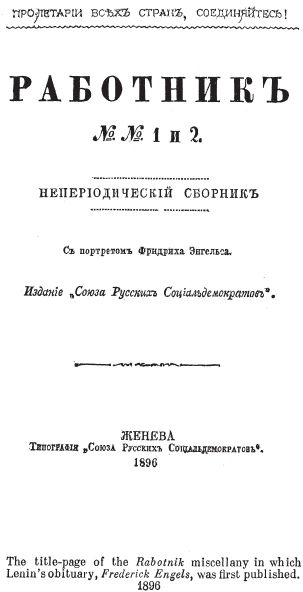
What a torch of reason ceased to burn,
What a heart has ceased to beat!
On August 5 (new style), 1895, Frederick Engels died in London. After his friend Karl Marx (who died in 1883), Engels was the finest scholar and teacher of the modern proletariat in the whole civilised world. From the time that fate brought Karl Marx and Frederick Engels together, the two friends devoted their lifes work to a common cause. And so to understand what Frederick Engels has done for the proletariat, one must have a clear idea of the significance of Marxs teaching and work for the development of the contemporary working-class movement. Marx and Engels were the first to show that the working class and its demands are a necessary outcome of the present economic system, which together with the bourgeoisie inevitably creates and organises the proletariat. They showed that it is not the well-meaning efforts of able-minded individuals, but the class struggle of the organised proletariat that will deliver humanity from the evils which now oppress it. In their scientific works, Marx and Engels were the first to explain that socialism is not the invention of dreamers, but the final aim and necessary result of the development of the productive forces in modern society. All recorded history hitherto has been a history of class struggle, of the succession of the rule and victory of certain social classes over others. And this will continue until the foundations of class struggle and of class dominationprivate property and anarchic social productiondisappear. The interests of the proletariat demand the destruction of these foundations, and therefore the conscious class struggle of the organised workers must be directed against them. And every class struggle is a political struggle.
These views of Marx and Engels have now been adopted by all proletarians who are fighting for their emancipation. But when in the forties the two friends took part in the socialist literature and the social movements of their time, they were absolutely novel. There were then many people, talented and without talent, honest and dishonest, who, absorbed in the struggle for political freedom, in the struggle against the despotism of kings, police and priests, failed to observe the antagonism between the interests of the bourgeoisie and those of the proletariat. These people would not entertain the idea of the workers acting as an independent social force. On the other hand, there were many dreamers, some of them geniuses, who thought that it was only necessary to convince the rulers and the governing classes of the injustice of the contemporary social order, and it would then be easy to establish peace and general well-being on earth. They dreamt of a socialism without struggle. Lastly, nearly all the socialists of that time and the friends of the working class generally regarded the proletariat only as an ulcer, and observed with horror how it grew with the growth of industry. They all, therefore, sought for a means to stop the development of industry and of the proletariat, to stop the wheel of history. Marx and Engels did not share the general fear of the development of the proletariat; on the contrary, they placed all their hopes on its continued growth. The more proletarians there are, the greater is their strength as a revolutionary class, and the nearer and more possible does socialism become. The services rendered by Marx and Engels to the working class may be expressed in a few words thus: they taught the working class to know itself and be conscious of itself, and they substituted science for dreams.
Font size:
Interval:
Bookmark:
Similar books «Collected Works, Volume 2»
Look at similar books to Collected Works, Volume 2. We have selected literature similar in name and meaning in the hope of providing readers with more options to find new, interesting, not yet read works.
Discussion, reviews of the book Collected Works, Volume 2 and just readers' own opinions. Leave your comments, write what you think about the work, its meaning or the main characters. Specify what exactly you liked and what you didn't like, and why you think so.

